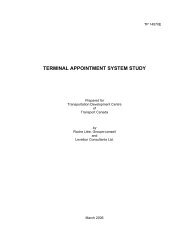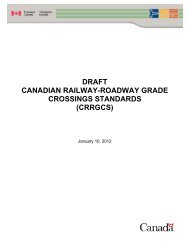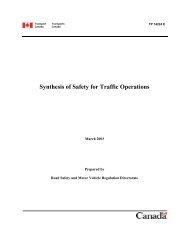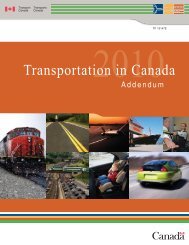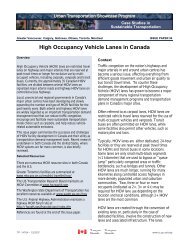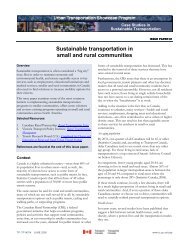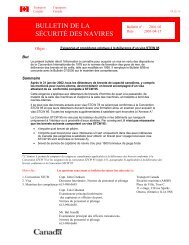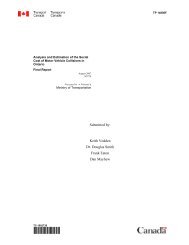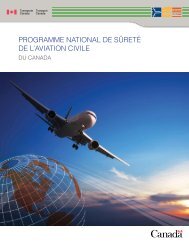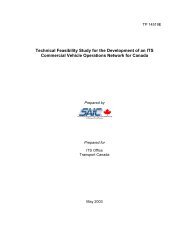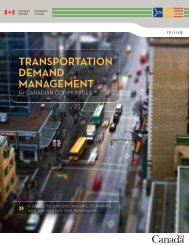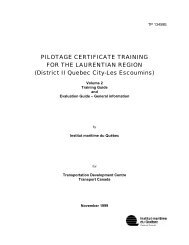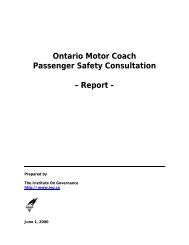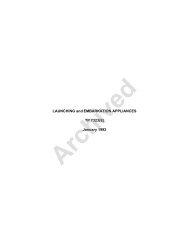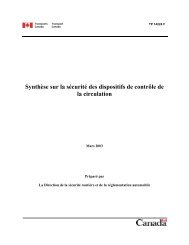APPROVED CHECK DISPATCHER MANUAL - Transport Canada
APPROVED CHECK DISPATCHER MANUAL - Transport Canada
APPROVED CHECK DISPATCHER MANUAL - Transport Canada
You also want an ePaper? Increase the reach of your titles
YUMPU automatically turns print PDFs into web optimized ePapers that Google loves.
<strong>APPROVED</strong> <strong>CHECK</strong> <strong>DISPATCHER</strong> <strong>MANUAL</strong> TP 14114<br />
(c) The flight dispatcher’s ability to quickly calculate the fuel to alternates from the flight plan<br />
during enroute or emergency situations;<br />
(d) The flight dispatcher’s ability to thoroughly check the runway limitation requirements under<br />
prevailing conditions;<br />
(e) Review the Flight Dispatch Bulletin/Notice and Memo books;<br />
(f) Enter information in the dispatcher log as required;<br />
(g) Review all MEL items as required, ensuring relevant conditions and procedures have<br />
been complied with;<br />
(h) Review planned flights, confirming flight watch status, planned alternates and<br />
additional fuel;<br />
(i) Review NOTAMs for route of flights, destinations, diversions and alternates;<br />
(j) Review all relevant METAR’s and TAFOR’s;<br />
(k) Review all GFA (graphical area forecasts), FA’s (area forecasts), AIRMETs, SIGMETS,<br />
PIREPs and other relevant meteorological information.<br />
Some common errors that may affect the assessment of briefings and briefing<br />
documentation are:<br />
(a) Dispatcher did not regularly check hourly weather;<br />
(b) Dispatcher was unable to calculate re-clearance in a timely manner;<br />
(c) Dispatcher did not calculate take-off performance correctly;<br />
(d) Dispatcher did not review alternates for potential amendments;<br />
(e) Dispatcher did not advise flight crews of relevant changes in a timely manner;<br />
(f) dispatcher not being pro active with regards to operations.<br />
10.5.6 dispatcher General Knowledge<br />
The ACD should verify the flight dispatcher’s general knowledge of <strong>Transport</strong> <strong>Canada</strong> and the<br />
air operator’s policies and regulations. The following are some areas that can be observed or<br />
questions asked to the dispatcher during a dCC:<br />
(a) the dispatcher has knowledge of abnormal operations (example: fuel calculations for gear<br />
down operations, landing distances for anti-skid inoperative, etc.);<br />
(b) the dispatcher knows the conditions requiring specific paperwork/authorization from<br />
<strong>Transport</strong> <strong>Canada</strong> or the air operator, etc.;<br />
(c) the dispatcher has a good working knowledge of <strong>Transport</strong> <strong>Canada</strong> and the air operator’s<br />
emergency procedures;<br />
(d) the dispatcher is familiar with the documents required for off line operations, government<br />
requirements or unscheduled landings (example: custom’s special procedures, handling of<br />
contracting agencies at unscheduled airports, etc.);<br />
(e) the dispatcher knows where to find data for airports at unscheduled landings (where it is<br />
found in the <strong>Canada</strong> Air Pilot, company charts, etc.);<br />
november 2011 - 2 nd Edition Page 41



